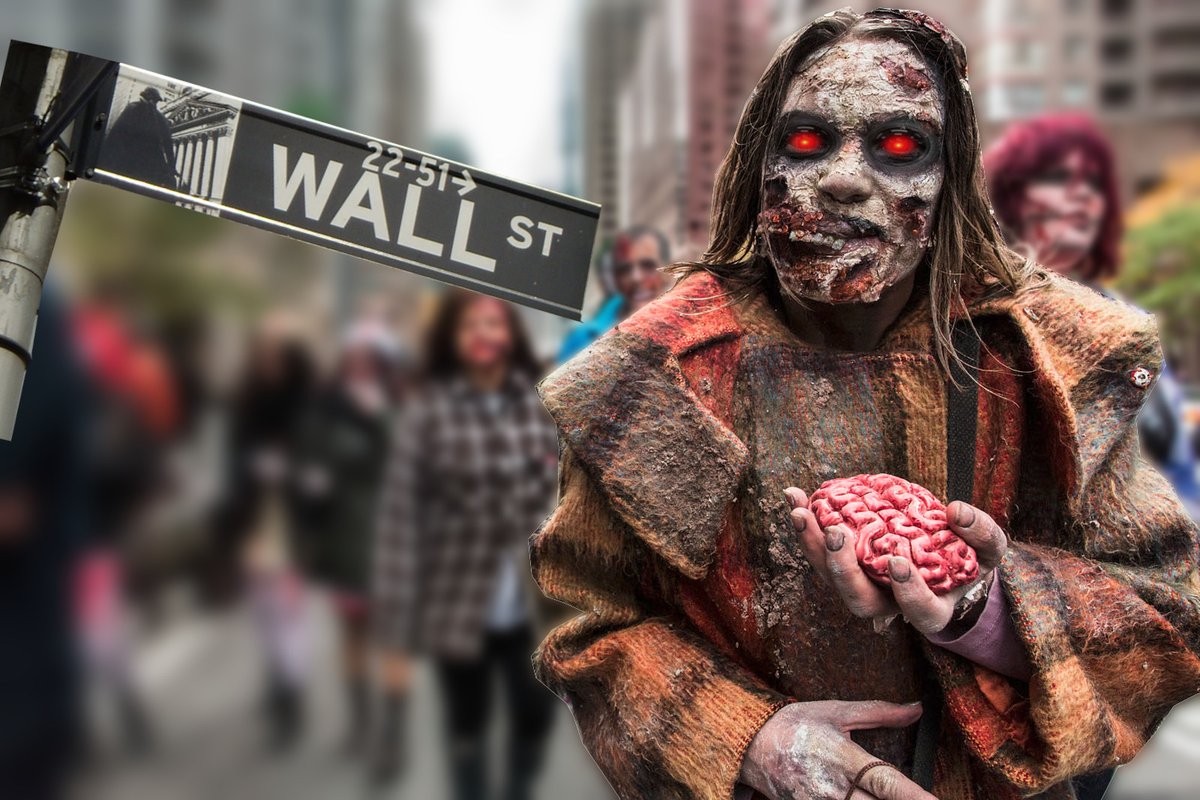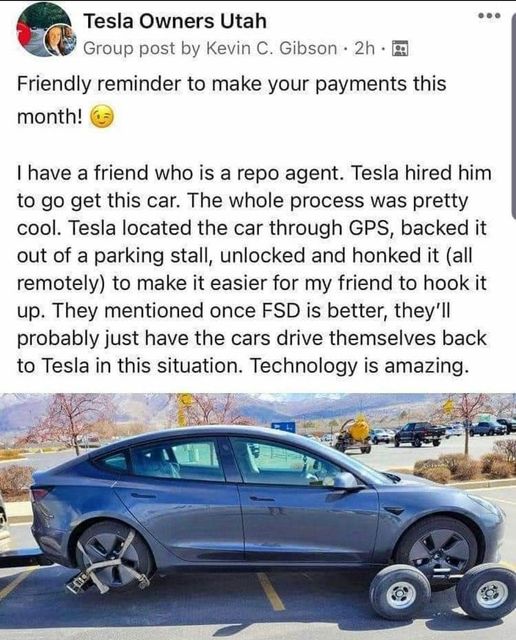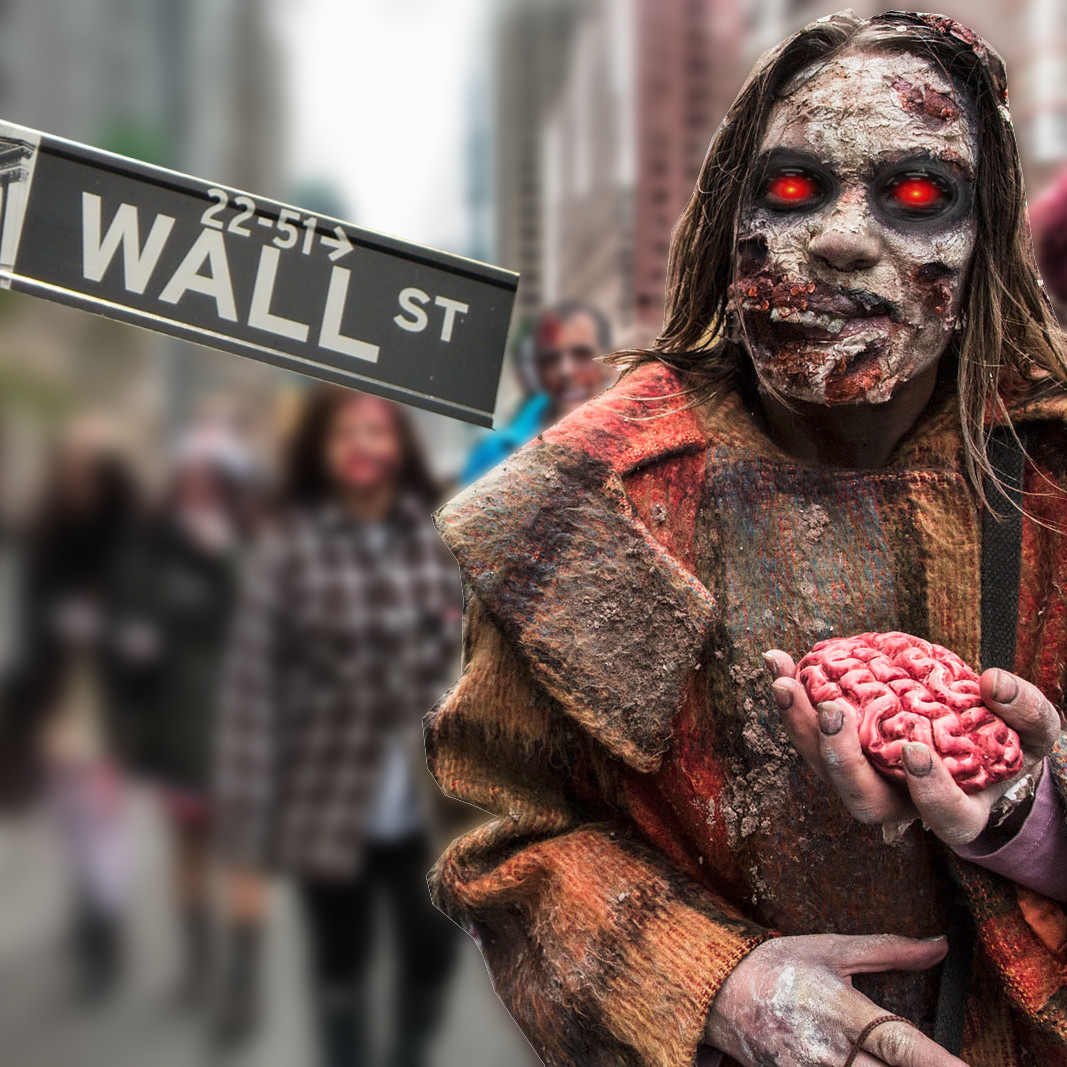
It's a zombie economy. For 40 years, we've eroded the wages of workers and transfered their share of profit and productivity to owners of capital. This is a problem, because people need money to buy things, and if they run out of money, they stop buying and profits vanish.
1/
1/

Time and again, capitalism has kicked any reckoning over this down the road. First came the great liquidation: pension cashouts, raided savings, reverse mortgages. Then came consumer borrowing, a tidal wave of unrepayable debt.
2/
2/
That's the zombie part: all the unpayable debt, which has been turned into bonds that enrich debt-holders. As Michael Hudson has told us again and again, debt that can't be paid, won't be paid. Our debt-based economy is the walking dead, a zombie.
3/
3/
We can either stabilize the economy (by forgiving debts, so that producers can pay for necessities and go on producing); or we can stabilize finance (by coercing debtors into destroying their lives in order to keep up on payments):
pluralistic.net/2020/03/24/gra…
4/
pluralistic.net/2020/03/24/gra…
4/
Think of the loan-shark's arm-breaker: he wants to collect on debt, so he threatens to break your arm. You steal your kid's college fund. You secretly mortgage the house. You sell your wedding-ring. You end up divorced and homeless. You still owe. So he breaks your arm.
5/
5/
Now you're divorced, homeless, and you've lost your ability to earn, and you've got medical bills. He threatens to break your other arm. You start breaking into cars to steal the toll money in the ashtrays. You go to jail. Finally the arm-breaker and his boss are out of luck.
6/
6/
Debts that can't be paid, won't be paid. But as loan-sharks know, fortunes can be collected by applying the right incentives.
Give debtors the choice of immediate ruin from nonpayment, and making a payment today and ruining their lives tomorrow, and they're pay.
7/
Give debtors the choice of immediate ruin from nonpayment, and making a payment today and ruining their lives tomorrow, and they're pay.
7/
They'll pay...until they can't. Because debts that can't be paid, won't be paid.
The zombie economy is the subprime economy. "Subprime" came into collective consciousness thanks to the great financial crisis, where banks tricked poor homebuyers into predatory loans.
8/
The zombie economy is the subprime economy. "Subprime" came into collective consciousness thanks to the great financial crisis, where banks tricked poor homebuyers into predatory loans.
8/
The banks knew that the loans couldn't be repaid - they had "balloon" clauses that jacked up payments beyond the borrowers' ability to repay a few years into the mortgage - but they also knew that threats of homelessness are powerful motivators.
9/
9/
The inscrutable equations used to "guarantee" subprime bonds all shared an unspoken assumption: people who face homelessness will go to extraordinary lengths to pay their mortgages. Behind every subprime loan is an arm-breaker.
10/
10/
The zombie economy shambles on. Obama's loan-shark bailout and the eviction crisis let the architects of subprime buy up whole towns' worth of homes and turn them into hugely profitable slums: high-rent, low-quality deathtraps.
reuters.com/investigates/s…
11/
reuters.com/investigates/s…
11/
Wall St landlords package rents from subprime rentals into bonds, backed by the loan-shark's guarantee: arm-breakers will evict the shit out of anyone who stops paying.
America-a land where eviction was once a rarity-now faces an eviction epidemic.
newyorker.com/magazine/2016/…
12/
America-a land where eviction was once a rarity-now faces an eviction epidemic.
newyorker.com/magazine/2016/…
12/
The foreclosure crisis was only possible because Wall St and the courts collaborated to streamline the historically complicated and time-consuming process of taking away someone's home. Same goes for the eviction epidemic.
13/
13/
It's a simple equation: the more loan-sharks spend on arm-breakers, the lower the expected profits.
Improvements to arm-breaking processes - cost-savings on traditional coercion or innovative new forms of terror - are powerful engines for unlocking new debt markets.
14/
Improvements to arm-breaking processes - cost-savings on traditional coercion or innovative new forms of terror - are powerful engines for unlocking new debt markets.
14/
When innovation calls, tech answers. Our devices are increasingly "smart," and inside every smart device is a potential arm-breaker. Digital arm-breakers have been around since the first DRM systems, but they really took off in 2008.
15/
15/
That's when subprime car loans boomed. People who lost everything in the GFC still needed to get to work, and thanks to chronic US underinvestment in transit, that means owning a car. So loan-sharks and tech teamed up to deliver a new lost-cost, high-efficiency arm-breaker.
16/
16/
They leveraged the nation's mature wireless network to install cellular killswitches in cars. You could extend an unrepayable loan to a desperate person, and use an unmutable second stereo system to bombard them with earsplitting overdue notices.
edition.cnn.com/2009/LIVING/wa…
17/
edition.cnn.com/2009/LIVING/wa…
17/
If they didn't pay, you could remotely cut off the ignition and send a precise location to your repo man.
Smart killswitches let you impose fine-grained control over debtors - say, enforcing a rule against driving over the county line.
dealbook.nytimes.com/2014/09/24/mis…
18/
Smart killswitches let you impose fine-grained control over debtors - say, enforcing a rule against driving over the county line.
dealbook.nytimes.com/2014/09/24/mis…
18/
Within a decade, the bond-market for payments from subprime car drivers was edging up on $1T; not because borrowers didn't default, but because they defaulted later, and the car could be easily re-leased to another desperate person.
19/
19/
The zombie economy shambled on. Tech built undeletable, always-on kill-switches, lo-jacks, and spyware into an ever-expanding constellation of devices, like laptops.
theatlantic.com/technology/arc…
20/
theatlantic.com/technology/arc…
20/
Rent-to-own subprime laptops were tepicenter of innovation in digital arm-breaking. Laptops shipped with spyware for covert operation of cameras and mic and access ot files.
That went beyond repoing a laptop! Lenders could make and share covert sex-tapes of their customers!
21/
That went beyond repoing a laptop! Lenders could make and share covert sex-tapes of their customers!
21/
They spied on children, plundered MP3 collections, stole passwords, read email. It was beyond the wildest dreams of analog loan-sharks.
ftc.gov/news-events/pr…
22/
ftc.gov/news-events/pr…
22/
To make a good digital arm-breaker, you need always-on network connectivity, a device that people really depend on, and a strong presumption that the device has core software that its owner is never allowed to remove.
Basically, a smartphone.
23/
Basically, a smartphone.
23/
Mobile carriers were early to this party. They collaborated with device manufacturers to create a "subsidized phone" market. They would "give" you a phone in exchange for a long-term, abusive contract, and then repo it by terminating service if you missed payments.
24/
24/
This was only possible because the manufacturers helped, creating phones that could be locked to a single network, so you couldn't un-repo your phone by sliding in someone else's phone.
25/
25/
They relied on the "anti-circumvention" laws that the music industry lobbied for in the late 90s (like Section 1201 of the DMCA) to make it a felony to unlock these phones. Arm-breaking is a lot easier if it's a felony to evade the arm-breaker.
26/
26/
The smarter the phones got, the more subprime opportunities there were. Remember, there's a new market in every arm-breaking innovation and in every arm-breaking efficiency.
Which brings me to India.
27/
Which brings me to India.
27/
India has a huge subprime market. As one of the world's inequality capitals, whose national government runs on performative culture war bullshit and giveaways to the super-rich, it's a land ripe for subprime innovation.
28/
28/
Phone manufacturers like @SamsungIndia are key to India's vast collateralized subprime smartphone market: first-time buyers get their phones on the installment plans at predatory interest rates so high that most will default
restofworld.org/2021/loans-tha…
29/
restofworld.org/2021/loans-tha…
29/
Remember: subprime isn't about debts being repaid in full. It's about making borrowers so desperate that they ruin their lives to make payments before they default.
Samsung's uninstallable arm-breaker app allows lenders to brick a smartphone without help from a carrier.
30/
Samsung's uninstallable arm-breaker app allows lenders to brick a smartphone without help from a carrier.
30/
Writing for @restofworld, @NilChristopher describes an "escalating series of annoyances" culminating with a full lockout for failure to repay:
* audiovisual prompts in regional languages as reminders
* changing the wallpaper on their cellphones
31/
* audiovisual prompts in regional languages as reminders
* changing the wallpaper on their cellphones
31/
That escalates to coercion based on analysis of the users' device activity:
* For "a prolific selfie-taker," notifications every time the camera is invoked
* frequently used messaging and social apps like Facebook or Instagram are progressively blocked
32/
* For "a prolific selfie-taker," notifications every time the camera is invoked
* frequently used messaging and social apps like Facebook or Instagram are progressively blocked
32/
One step at a time, the phone is made progressively less usable, until it is fully bricked.
It's a fully automated, self-configuring arm-breaker, one that substitutes a thug's unscientific ladder of mounting terror with bloodless, statistical science.
33/
It's a fully automated, self-configuring arm-breaker, one that substitutes a thug's unscientific ladder of mounting terror with bloodless, statistical science.
33/
This is probably a good point to mention the Shitty Technology Adoption Curve: any disciplinary technology is tried out on powerless people first, and gradually works its way up the privilege gradient to encompass the whole world.
pluralistic.net/2021/02/24/gwb…
34/
pluralistic.net/2021/02/24/gwb…
34/
Debt, after all, is consuming all of us except for the lucky few at the very top of the wealth distribution who have not faced wage stagnation and forced liquidations.
35/
35/
The covid crisis pushed whole countries into subprime status. Pfizer has told poor countries that they can only get access to vaccines if they stake their sovereign assets as collateral to settle claims related to its products:
thebureauinvestigates.com/stories/2021-0…
36/
thebureauinvestigates.com/stories/2021-0…
36/
And the shitty-tech adoption curve is putting arm-breaking tech into every kind of device, spreading with alarming speed from the bottom of the social order to its apex.
37/
37/
Miss your Tesla payments and your car will lock itself, summon a repo man, back itself out of the parking lot, honk its horn, and unlock its doors for the repo man.
tiremeetsroad.com/2021/03/18/tes…
38/
tiremeetsroad.com/2021/03/18/tes…
38/

As subprime climbs the shitty tech adoption curve, it gets a new name: "software as a service." In a #SaaS world, you cannot own the tools of your profession. Adobe Photoshop becomes Adobe Creative Cloud, and any designer who stops monthly payments becomes economic roadkill.
39/
39/
What's more, software is the ghost in the shell, the animating spirit within physical devices. Remove software from a smart device and you don't have a dumb device, you have a brick.
40/
40/
This lets the arm-breakers exert pressure over larger, more powerful entities...like Hoboken, NJ. Hoboken had a payment dispute with the software vendor for its robotic parking garage, so the vendor bricked the garage and took all the cars hostage.
wired.com/news/technolog…
41/
wired.com/news/technolog…
41/
The strange mutations of arm-breaker tech bodes ill, especially in light of Chekhov's Law: "A phaser on the bulkhead in Act One will go off by Act Three."
42/
42/
The universal spread of devices DESIGNED to be remotely repoed - bricked, downgraded, turned into surveillance tools - means that oppressive governments that coerce manufacturers will have the power to reach into our homes, cars and pockets to attack us.
43/
43/
Same goes for unscrupulous insiders - like the subprime laptop jokers making nonconsensual sex-tapes with their customers' webcams - and criminals who can pressure insiders into acting on their behalf.
44/
44/
Nevertheless, subprime arm-breaking is bound to spread, and spread, and spread. Covid forced millions to liquidate everything, left them in precarious, sub-minimum-wage gig work, and there's the millions of evictions waiting for the moratorium to end.
45/
45/
Debts that can't be paid, won't be paid. And yet, people must participate in the zombie economy: they're not going to dig a hole, climb in, and pull the dirt in on top of themselves. There is strong demand for credit on any terms. Any.
46/
46/
Arm-breaker tech unlocks new markets by delaying defaults on unpayable debts. The zombie economy shambles on.
41/
41/
If you'd like an unrolled version of this thread to read or share, here's a link to it on pluralistic.net, my surveillance-free, ad-free, tracker-free blog:
pluralistic.net/2021/04/02/inn…
42/
pluralistic.net/2021/04/02/inn…
42/
Image: Cryteria (modified)
commons.wikimedia.org/wiki/File:HAL9…
Sachab (modified):
flickr.com/photos/sachab/…
CC BY:
creativecommons.org/licenses/by/3.…
Kat Northern Lights Man (modified):
flickr.com/photos/orangeg…
CC BY-NC:
creativecommons.org/licenses/by-nc…
eof/
commons.wikimedia.org/wiki/File:HAL9…
Sachab (modified):
flickr.com/photos/sachab/…
CC BY:
creativecommons.org/licenses/by/3.…
Kat Northern Lights Man (modified):
flickr.com/photos/orangeg…
CC BY-NC:
creativecommons.org/licenses/by-nc…
eof/
• • •
Missing some Tweet in this thread? You can try to
force a refresh












